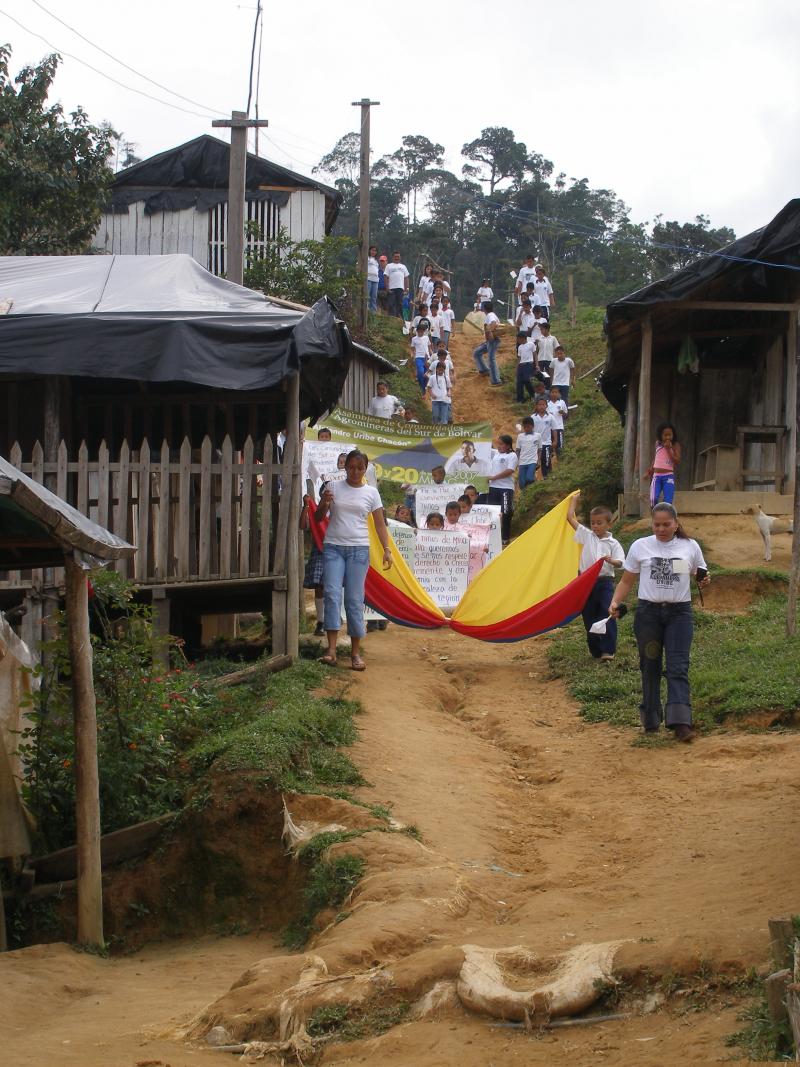For decades, the residents of the Southern Bolívar subregion have suffered the impacts of violence associated with the armed conflict and territorial and economic disputes that various legal and illegal actors have developed throughout their territory. This context has caused farming, indigenous and mining communities to live under constant threat against their lives and experience systematic violations of their human and fundamental rights.
Currently, a war is being waged in the subregion between the National Liberation Army (ELN), the 37th Front dissident group of the FARC, the Gaitanista Self-Defense Forces (AGC), and the Colombian Military’s Joint Task Force Mars. This conflict that began last year has created a condition of vulnerability for the civil population that, on many occasions, has been caught in the middle of combat, suffering threats and assassinations of its community and social leaders. On 26 July 2021, Oswaldo Pérez—leader of the Mina Piojo community action board—was assassinated, unleashing the recent forced displacement of approximately 2000 people in the municipalities of Santa Rosa del Sur, Arenal, Morales and Montecristo. The cause of this serious violation of Human Rights and International Humanitarian Law lies squarely with the increase in confrontations between armed groups in the San Lucas mountain range.
On 1 August, displaced families arrived at the Municipality of Santa Rosa to call on the municipal, departmental and national administrative authorities, guerrilla and paramilitary groups, and the national army to respect life, permanence in the territory and the non-involvement of civilians in the armed conflict. It is important to note that the population is not only being torn from their homes, but also faces stigmatization from local authorities and the media who have made dangerous accusations against social organizations. The social leaders and mining and farming families who belong to these organizations face increased risk to their lives as these powerful voices associate them as collaborators of a violent group.
After several days of dialogue between the community, administrative authorities, state institutions and state forces—lacking clear answers or solutions that would guarantee a safe return for the more than 2000 displaced people and adding to the insufficient humanitarian assistance provided by the local entities and the stigmatization against social organizations—the communities decided to return to their territories without having obtained the minimum guarantees for their safety.
Christian Peacemaker Teams witnessed the difficult humanitarian conditions that the displaced families experienced for almost nine days and of the work carried out by social organizations to improve conditions in the shelter where the communities stayed. In addition, CPT witnessed the work of the International Committee of the Red Cross and the Jesuit Refugee Service, which made it possible to mitigate the complex humanitarian conditions experienced by the displaced population. Likewise, we express our concern for the safety and lives of the civilian population returning to the territory without explicit guarantees that resolve or mitigate the impacts of the war on those who have nothing to do with it.
Finally, CPT expresses our solidarity with all the people who have been victims of violence and who today return home with more doubts than clarity. We call on the local authorities, the Colombian state, and the armed groups to respond to the following requests from the community:
- Construction of a Humanitarian Shelter in the San Pedro Frío township, which will serve to temporarily shelter people and families who are threatened by armed actors.
- That the state guarantee decent living conditions for the population as the most effective mechanism to defuse the conflict.
- That the authorities at all levels respect and not interfere in the Humanitarian Action for Life and Permanence in the territory, which will function through Pastoral and Community Dialogues.
- That the state respond to the region’s social challenges through other means than the increase in force and militarization of the territory.
- That legal and illegal armed groups do not involve civilians in the dynamics of the armed conflict.
These calls to action would facilitate the construction of a negotiated solution to the armed conflict in the Southern Bolívar region, thus allowing the development of a dignified life for all the farming and mining communities located there.




